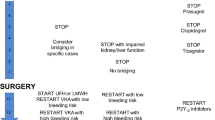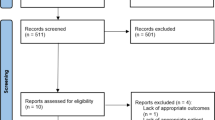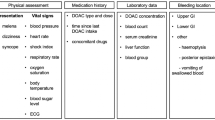Abstract
Background
The management of antithrombotic agents for endoscopic procedures has recently focused on preventing periprocedural thrombosis in Western countries. However, this focus on shorter cessation of antithrombotic agents needs to be examined for its implications for post-procedural bleeding, with potential risk factors for such bleeding clarified in real-world clinical settings in Japan.
Methods
A Sapporo consensus group convened and developed a consensus document on the criteria for cessation of antithrombotic agents. In the multicenter, prospective, observational study that followed to validate the criteria in a real-world clinical setting, of all patients ≥20 years of age receiving antithrombotic agents and undergoing endoscopic procedures, all consenting patients were enrolled. All participating facilities were followed up on their adherence to the criteria and clinical outcomes, such as the occurrence of post-procedural bleeding and thrombosis.
Results
A total of 5250 patients, who accounted for 6944 endoscopic procedures, were enrolled from 19 study sites. The consensus criteria, which proved to be nearly consistent with the JSGE criteria revised in 2012, had been adhered to in a total of 6531 procedures performed in 4921 patients. Bleeding and thrombosis were reported in 53 (0.76 %) and two (0.03 %) patients, respectively, among those receiving antithrombotic agents. Post-procedural bleeding was significantly associated with high-bleeding-risk procedures, a high thromboembolic risk with heparin bridging, and the presence of renal failure/dialysis.
Conclusions
With the new criteria in place for cessation of antithrombotic agents focused on prevention of periprocedural thrombosis, endoscopic procedures may be safely performed without substantially increasing bleeding in clinical practice in Japan.

Similar content being viewed by others
References
Kadakia SC, Angueira CE, Ward JA, et al. Gastrointestinal endoscopy in patients taking antiplatelet agents and anticoagulants: survey of ASGE members. American Society for Gastrointestinal Endoscopy. Gastrointest Endosc. 1996;44(3):309–16.
Ogoshi K, Kaneko E, Tada M, et al. The management of anticoagulation and antiplatelet therapy for endoscopic procedures. Gastroenterol Endosc. 2005;47:2691–5 (in Japanese).
Lee SY, Tang SJ, Rockey DC, et al. Managing anticoagulation and antiplatelet medications in GI endoscopy: a survey comparing the East and the West. Gastrointest Endosc. 2008;67(7):1076–81.
Maulaz AB, Bezerra DC, Michel P, et al. Effect of discontinuing aspirin therapy on the risk of brain ischemic stroke. Arch Neurol. 2005;62(8):1217.
Biondi-Zoccai GG, Lotrionte M, Agostoni P, et al. A systematic review and meta-analysis on the hazards of discontinuing or not adhering to aspirin among 50,279 patients at risk for coronary artery disease. Eur Heart J. 2006;27(22):2667–74.
Moussa ID, Colombo A. Antiplatelet therapy discontinuation following drug-eluting stent placement: dangers, reasons, and management recommendations. Catheter Cardiovasc Interv. 2009;74(7):1047–54.
Garcia DA, Regan S, Henault LE, et al. Risk of thromboembolism with short-term interruption of warfarin therapy. Arch Intern Med. 2008;168(1):63–9.
Sung JJ, Lau JY, Ching JY, et al. Continuation of low-dose aspirin therapy in peptic ulcer bleeding: a randomized trial. Ann Intern Med. 2010;152(1):1–9.
ASGE Standards of Practice Committee, Anderson MA, V T, Gan SI, et al. Management of antithrombotic agents for endoscopic procedures. Gastrointest Endosc. 2009;70(6):1060–70.
Boustière C, Veitch A, Vanbiervliet G, et al. Endoscopy and antiplatelet agents. European Society of Gastrointestinal Endoscopy (ESGE) Guideline. Endoscopy. 2011;43(5):445–61.
Fujishiro M, Oda I, Yamamoto Y, et al. Multi-center survey regarding the management of anticoagulation and antiplatelet therapy for endoscopic procedures in Japan. J Gastroenterol Hepatol. 2009;24(2):214–8.
Ono S, Fujishiro M, Kanzaki H, et al. Conflicting clinical environment about the management of antithrombotic agents during the periendoscopic period in Japan. J Gastroenterol Hepatol. 2011;26(9):1434–40.
Tamai Y, Takami H, Nakahata R, et al. Comparison of the effects of acetylsalicylic acid, ticlopidine and cilostazol on primary hemostasis using a quantitative bleeding time test apparatus. Haemostasis. 1999;29(5):269–76.
Shinohara Y, Katayama Y, Uchiyama S, et al. Cilostazol for prevention of post-procedural stroke (CSPS 2): an aspirin-controlled, double-blind, randomised non-inferiority trial. Lancet Neurol. 2010;9(10):959–68.
Fujimoto K, Fujishiro M, Kato M, et al. Guidelines for gastroenterological endoscopy in patients undergoing antithrombotic treatment. Dig Endosc. 2014;26(1):1–4.
Ono S, Fujishiro M, Kodashima S, et al. Evaluation of safety of endoscopic biosy without cessation of antithrombotic agents in Japan. J Gastroenterol. 2012;47:770–4.
Fujita M, Shiotani A, Murao T, et al. Safety of gastrointestinal endoscopic biopsy in patients taking antithrombotics. Dig Endosc. 2015;27:25–9.
Matsumura T, Arai M, Maruoka D, et al. Risk factors for early and delayed post-operative bleeding after endoscopic submucosal dissection of gastric neoplasms, including patients with continued use of antithrombotic agents. BMC Gastroenterol. 2014;14:172.
Sanomura Y, Oka S, Tanaka S, et al. Continued use of low-dose aspirin does not increase the risk of bleeding during or after endoscopic submucosal dissection for early gastric cancer. Gastric Cancer. 2014;17(3):489–96.
Ninomiya Y, Oka S, Tanaka S, et al. Risk of bleeding after endoscopic submucosal dissection for colorectal tumors in patients with continued use of low-dose aspirin. J Gastroenterol. 2015;50:1041–6.
Shioji K, Suzuki Y, Kobayashi M, et al. Prophylactic clip application does not decrease delayed bleeding after colonoscopic polypectomy. Gastrointest Endosc. 2003;57(6):691–4.
Feagins LA, Nguyen AD, Iqbal R, et al. The prophylactic placement of hemoclips to prevent delayed post-polypectomy bleeding: an unnecessary practice? A case control study. Dig Dis Sci. 2014;59(4):823–8.
Katsinelos P, Fasoulas K, Chatzimavroudis G, et al. Prophylactic clip application before endoscopic resection of large pedunculated colorectal polyps in patients receiving anticoagulation or antiplatelet medications. Surg Laparosc Endosc Percutan Tech. 2012;22(5):e254–8.
Koh R, Hirasawa K, Yahara S, et al. Antithrombotic drugs are risk factors for delayed postoperative bleeding after endoscopic submucosal dissection for gastric neoplasms. Gastrointest Endosc. 2013;78:476–83.
Yoshio T, Nishida T, Kawai N, et al. Gastric ESD under Heparin Replacement at High-Risk Patients of Thromboembolism Is Technically Feasible but Has a High Risk of Delayed Bleeding: Osaka University ESD Study Group. Gastroenterol Res Pract. 2013. doi:10.1155/2013/365830.
Matsumoto M, Mabe K, Tsuda M, et al. Multicenter study on hemorrhagic risk of heparin bridging therapy for periendoscopic thromboprophylaxis. BMC Gastroenterol. 2015;15(1):89. doi:10.1186/s12876-015-0315-1.
Douketis JD, Spyropoulos AC, Kaatz S, et al. Perioperative Bridging Anticoagulation in Patients with Atrial Fibrillation. N Engl J Med. 2015;373(9):823–33.
Li HK, Chen FC, Rea RF, et al. No increased bleeding events with continuation of oral anticoagulation therapy for patients undergoing cardiac device procedure. Pacing Clin Electrophysiol. 2011;34(7):868–70.
Cheng A, Nazarian S, Brinker JA, et al. Continuation of warfarin during pacemaker or implantable cardioverter-defibrillator implantation: a randomized clinical trial. Heart Rhythm. 2011;8(4):536–40.
Desai J, Granger CB, Weitz JI, et al. Novel oral anticoagulants in gastroenterology practice. Gastrointest Endosc. 2013;78(2):227–39.
Parekh PJ, Merrell J, Clary M, et al. New anticoagulants and antiplatelet agents: a primer for the clinical gastroenterologist. Am J Gastroenterol. 2014;109(1):9–19.
Acknowledgments
Sapporo Consensus Group The Sapporo Consensus Group comprised the following hospitals (participants): Hokkaido University Hospital (K. Mabe, M. Kato); Sapporo Medical University School of Medicine (K. Yamashita); KKR Sapporo Medical Center (H. Seki, Y. Ishibashi); Otaru Ekisaikai Hospital (S. Katsuki, K. Takanashi); Nakagawa Ichoka Clinic (S. Nakagawa); Kushiro Rosai Hospital (K. Takahashi); Sapporo Higashi Tokushukai Hospital (K. Kimura); Hakodate Municipal Hospital (K. Yamamoto); Keiwakai Ebetsu Hospital (K. Shinada); Keiyukai Sapporo Hospital (J. Kodaira); Japanese Red Cross Kitami Hospital (M. Uebayashi); Kinikyo Sapporo-Nishiku Hospital (S. Imazu); Sapporo Hokuyu Hospital (M. Kudo); Otaru Kyokai Hospital (M. Hirayama); Abashiri Kosei General Hospital (M. Onodera); IMS Sapporo Hospital (Y. Konno); Shibetsu City Hospital (T. Sato); Hakodate Chuo Hospital (J. Konno); and Teine-Keijinkai Hospital (T. Tanuma).
Author information
Authors and Affiliations
Consortia
Corresponding author
Ethics declarations
Conflict of interest
The authors declare that they have no conflict of interest.
Additional information
The members of the Sapporo Consensus Study Group are listed in the Acknowledgments.
Electronic supplementary material
Below is the link to the electronic supplementary material.
Rights and permissions
About this article
Cite this article
Mabe, K., Kato, M., Oba, K. et al. A prospective, multicenter survey on the validity of shorter periendoscopic cessation of antithrombotic agents in Japan. J Gastroenterol 52, 50–60 (2017). https://doi.org/10.1007/s00535-016-1203-3
Received:
Accepted:
Published:
Issue Date:
DOI: https://doi.org/10.1007/s00535-016-1203-3




